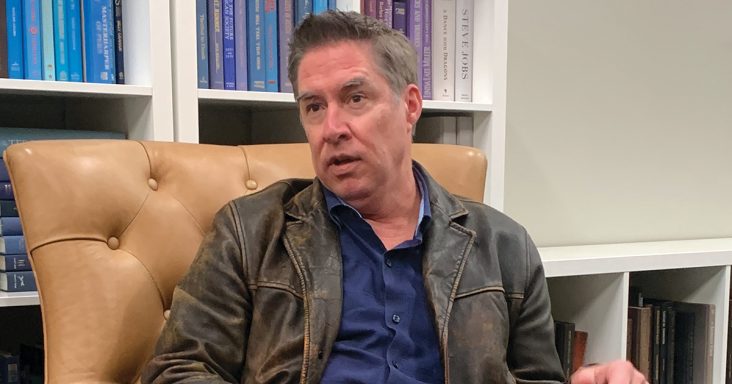‘Dead Man’s Hand’ author discusses Russian invasion of Ukraine
by March 5, 2024 9:27 am 336 views

For more than 30 years the United States and the Soviet Union were the two nuclear titans that had a shared philosophy when it came to the launch of nuclear weapons — mutually assured destruction, or “MAD.”
That changed on March 23, 1983, when then President Ronald Reagan began to tout the Strategic Defense Initiative that could among other things destroy Soviet nuclear missiles in space after they launched. The system was coined “Star Wars” by the media as it seemed futuristic just like the popular movie series that launched during that period, according to Barron’s.
The U.S. government spent billions of dollars trying to develop the system that never really worked. Brad Taylor, a former Army special forces lieutenant colonel and best-selling author, told Talk Business & Politics that the Soviets believed Star Wars was real, and they developed an unknown counter measure that could still be in use — the Dead Hand.
In theory, the system would launch a counterstrike if communications between Moscow and its commanders were severed, Taylor said. There are several military analysts who think the Dead Hand could still be in operation in Russia, he said.
The system has rudimentary artificial intelligence. In theory it could possibly detect a nuclear attack or the symptoms of one such as an increase in radiation levels or unusual seismic or electromagnetic activity.
It’s uncertain if the system can still operate, but Russia’s stymied efforts to take over Ukraine have shown the dilapidated state of its military equipment and systems, Taylor said. That could be problematic if the more than 40-year-old Dead Hand still exists or is in use in some capacity.
“It [‘Star Wars’] scared the Soviets,” Taylor said. “The theory behind it is that during a first strike the bureaucrats and commanders might be killed or cut off from launching a counterstrike … it means that no one had to be at the switch to launch a counterattack.”
Taylor, who has written 17 New York Times best-selling books, just released his 18th book, “Dead Man’s Hand.” He doesn’t typically write about current events in his fictional books, but recent events in Ukraine spurred the premise of this book, he said.
The author spent 21 years in the U.S. Army including eight years as a commander in the 1st Special Forces Operational Detachment — Delta. He served in Iraq, Afghanistan, and participated in other top-secret operations, he said. After his service ended, he worked for a time as a professor of military science at The Citadel in Charleston, S.C., where he still lives.
Taylor often travels to the places that are depicted in his books. He’s been publicly critical of the Russian government so traveling there or into war-torn Ukraine didn’t seem feasible.
Instead he traveled to countries like Estonia that could be threatened if Russia is successful in its action in Ukraine.
Russia’s invasion of Ukraine more than two years ago is not going well for the Russians, or their leader Vladimir Putin, he said. If the United States and its western allies fund the Ukrainians and arm them it’s clear Ukraine can win, he said. The Russian war machine is so tattered, and Putin’s position is so precarious that conscription has been ordered in the country to fill its depleted soldier ranks. But it only applies to male citizens in Russia’s hinterlands — far from Moscow and political consequences for Putin and his regime.
“Many of these new conscripts don’t even speak Russian. They have no training or usable trade craft. They are poorly equipped … they are essentially cannon fodder.”
Russia invaded Ukraine on Feb. 24, 2022. It could have ended the war early on if its armies had taken the airfield near Ukraine’s capital of Kiev, but they were repelled, Taylor said. Russian forces have taken over parts of the Donbas region in the eastern part of the country, and it’s taken over lands in the south near Crimea. Most of the battle lines have stabilized other than small bits of territory exchanging hands from time-to-time, Taylor said.
Ukrainian hopes to regain some of these areas including the Donbas region might be unrealistic, Taylor said. Areas in the eastern part of the country tended to be more pro-Russian to begin with and now all the culture systems — language, currency, schools, banking, etc. — are Russian systems.
Each time the Ukrainians are given money and weapons, the Ukrainians thwart the Russian army. Taylor said. He doesn’t understand the political calculations of not supporting the Ukrainians. If they lose, it could lead to a broader conflict involving other NATO countries in the region and the United States.
“Attacks on other NATO countries hinge on what happens in Ukraine. His [Putin’s] sole purpose is to reconstitute the old Soviet Union,” he said.
One option Taylor explores in his fictional book is an attempt to assassinate Putin. In real life that might be a disaster for the west, he said. If the Dead Hand system or something similar is in place, Putin might have it prearranged that if something happens to him, Russia’s nuclear weapons might be fired, he said.
Another potential problem is that if he was to be assassinated, the Russian people would rally around their flag, and expanded conflict might be inevitable. The best option remains to contain Russian aggression by stopping him with aid to Ukraine.
“It’s a war they can win. We don’t have to put our soldiers or citizens in harm’s way. All we have to do is support them.”
